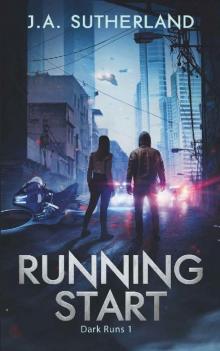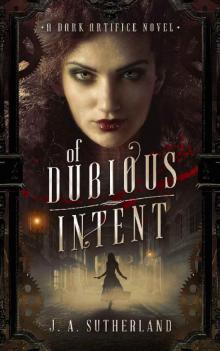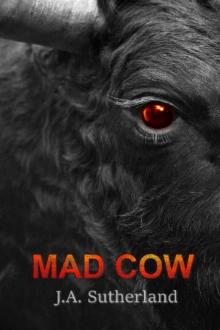- Home
- J. A. Sutherland
Of Dubious Intent Page 2
Of Dubious Intent Read online
Page 2
She sometimes thought it was odd she couldn’t clearly remember anything before that moment, only the words and the warmth of her mother’s lips on her skin and the scent of her that always meant she was safe and loved, but perhaps life had been hard. Lord knew there were things that had happened since that she wished she could forget. She raised one hand to her chest and felt the locket beneath her shirt.
Not a proper locket, surely, but that’s what she called it. Just a leather thong with two locks of hair tied tightly around it and bound with string. A lock from her mother, that Mother Agnes had given her, and a lock from Mother Agnes herself, that Cat had cut from the old woman’s head when she’d found her dead that horrible morning.
Mother Agnes had never called her anything but “boy,” a constant reminder of the lie and how important it was to remember it.
When Mother Agnes had died and Cat approached the gang of boys she thought might take her in, Brandt looked her up and down and said simply, “Are you quick, runt?”
Quick, she was, but without a better name to give them, the gang had called her Runt thereafter, never suspecting that she was girl. But the man in the market had, and that was surprising. Her hair was shorter even than most of the boys wore theirs, not only for the disguise, but to hide its reddish tint from Brandt and his bigotry, and her clothes were the same, shapeless rags all the boys wore.
Had he known? Or just guessed at a distance? She supposed it didn’t matter. Even if Brandt and the others had heard him and believed it, she could never go back to them anyway. Would never go back.
Cat sniffed and pulled the stolen purse from inside her trousers. She squeezed it hard and grinned at the crunch of metal from within. The seams were pulled tight, it was so full, and the shapes of coins were showing through the thin leather.
With this I’ll pick any name I want, she thought. A proper name. And I’ll eat proper food. Her stomach growled and her mouth filled at the thought. She’d walk straight into an inn, slide real coin onto the table, and eat her fill.
“And I’ll wear proper clothes when I do it,” she said aloud. A dress, like the girls in the market square wore — those who had families and even a bit of respectability that let them take real work. Those who didn’t have to hide what they were. They had mothers and fathers and a place to start, not the desperate, gnawing hunger that left you open to doing anything to fill it. Fathers and brothers who’d protect them, not a gang of boys who’d see nothing but what the nearest pimp would pay.
She squeezed the purse again. It was so full. It’s a fortune!
Cat pushed the thought down, telling herself the purse could be full of no more than pence or farthings, though why would a man of some substance carry so many small coins. Even if it was … She eyed it, estimating.
Even if it’s only pence, there must be hundreds!
She squeezed again, relishing the anticipation. She felt the size of the coins through the leather. Some were the size of pence, but others were certainly shillings. There were larger coins, too, and she tried to think. She eyed the bag. Could there be guineas?
Never, not in all the years they’d worked the market, had the gang seen a guinea coin. Shillings if they were lucky, and the occasional crown, but mostly pence and less. Guineas came out in the wealthier markets. The ones where Brandt and their gang would stick out and be noticed, so they’d never worked them.
Cat bit her lip and stared at the purse. The outline of one coin caught her eye. If it were a guinea … how much would that be worth? With twenty pence in a shilling and twelve of those in a pound — thirteen in a guinea. Could one coin really be worth that much?
More than two hundred pennies from one coin?
The thought was staggering. Cat stopped breathing for a moment at the implications. Dinner in a pub — a real dinner — was but a tuppence. If that one coin was gold it would mean …
“Months,” she breathed, barely daring to hope. She closed her eyes and clutched the purse to her chest. Could there really be a single coin in that purse that would feed her for a month?
She sniffed and scrubbed at her eyes again, then looked up at the sky. It was a beautiful day. The sun was still high and the clouds were white against a brilliant, blue sky. There was just enough of a breeze, here above the streets where the buildings didn’t block it, to make the sun’s warmth pleasant.
She had a sudden thought and bit her lip again. She’d never prayed. Brandt’s gang wasn’t the sort to enter a church, even if they’d be allowed. She couldn’t even, really, think of the words to a single prayer.
“Please?” she whispered. She couldn’t think of any other words, but surely if God were there, if He’d listened, He’d know what she was asking.
Cat swallowed hard and opened the drawstring at the top of the purse. She closed her eyes and reached inside. Her fingertips touched cool metal and she smiled. She chose one of the smaller coins, one she was certain would be a shilling, and pulled it out.
She opened her eyes.
The disk she held was the size and shape of a shilling, but it wasn’t silver. Nor was it gold, nor even copper. It was black, mostly, with spots of orange-red.
Cat raised it close to her face and stared at it, then touched it to her tongue.
“Iron?” she whispered in disbelief.
She set the black disk on the rooftop and reached into the purse again, pulling out another. This too was black and flecked with rust. She dropped it and pulled out a handful, crying out at the sight of more orange and black, rather than the copper, silver, and gold she’d been praying for.
“No,” she cried. “No!”
She upended the leather purse over her palm, pouring its contents out, staring at the cascade of black disks that fell from her hand to the rooftop and rolled down to the edge before falling to the street below.
Iron, all, and worthless.
Chapter 3
Cat ran.
She seemed to be doing a lot of that since stealing the purse full of iron. In fact, it seemed that was all she’d been doing. She’d moved steadily away from Brandt’s territory, trying to find some place for herself. The markets were what she knew, though, and they were all claimed by gangs that had no interest in someone who hadn’t grown up with them.
“Get him!” one of the boys chasing her yelled.
And do you think that isn’t what the rest of them are trying already?
Her feet pounded the pavement, her arms pumped, she dodged around and between shoppers in the market square, trying to get away. This square was unfamiliar to her. She’d crossed to the far side of the city, as far as she could get from Brandt’s territory, trying to find a place, but there were other gangs everywhere. Gangs, or the constables, or private guards.
She hadn’t even been trying to make a score today. Her purse-knife was safely hidden away and she’d simply been walking through the market, taking its measure and hoping for a bit of dropped bread or other food no one would miss. But someone from the local gang had spotted her and the chase was on. Her dress marked her as belonging to the streets, and they’d not allow someone new in their territory — any competition had to be driven out.
When she’d first recovered from the shock of finding nothing but iron in the stolen purse, she’d thought to find a new gang. That was foolish, she realized now. She was too old and had no history with any of the other gangs. They’d take in someone who’d grown up in their territory, that was how they got new members, but not someone from outside. None of them knew her, they didn’t trust her, and assumed there must be something wrong with her.
Ahead of her, a beggar saw her coming and stretched out his leg into her path, probably hoping for a bit of coin from the boys who worked this market.
Cat leapt over his leg, but missed her footing when she landed — her foot hit the edge of a raised cobble and slipped off it, twisting her ankle. She kept running, but every step sent knife-sharp lances of pain up her leg.
She saw other boys ahead
of her, moving to cut her off, and spun to dart between two stalls. Her ankle twisted again, giving way during the turn, and she cried out. That caused her to stumble and she threw her hands out to catch herself on the hard cobbles, grit and pebbles scraping her palms, and pain shooting from her knee as it slammed into the stone.
A body landed on her, driving her to the ground and knocking the breath from her.
“Bastard!” the boy on top of her yelled, forcing her head to the ground with his forearm. “Stay outta our patch!” He drove his fist into her side.
Cat tried to get her hands under her to rise or twist away from him, but his weight held her firmly and he punched her in the side again.
“’Ere now! Off ‘im!” a voice yelled and the boy’s weight left her back.
Cat scrambled forward, first to her hands and knees, then getting her feet under her before she looked back. A man, perhaps one of the merchants, was holding the boy by the scruff of the neck, but the rest of the gang was closing in fast. She turned away and ran for the nearest alleyway. Her knowledge of this part of town was far less than that of the territory she’d prowled with Brandt’s gang. She had no idea if this alley would lead her to freedom or dead-end and leave her trapped.
Her side hurt where the boy had punched her and her knees and palms were scraped and raw. There had been rain earlier in the day and while that always washed the streets clean it only seemed to wash the worst of the refuse into puddles at the center of alleyways. Water splashed up her legs as she ran, smelling of putrid refuse and worse.
Cat’s legs burned with the effort of running. Normally she could run forever and never get tired — even scramble up pipes and rough walls to the rooftops, and run across their sloping surfaces for miles, leaping the occasional gap between buildings. The days since she’d run from Brandt’s gang had put a stop to that, though. Now her body felt weak and leaden. Her gut ached with hunger. The last thing she’d eaten had been a half-rotted turnip, scrounged from the reeking surface of an alley just like this one.
Something struck her shoulder and a rock flew by her head. The boys behind her were throwing things and there was no way for her to dodge within the narrow alley. She could hear their splashing footsteps growing closer. Another rock struck the back of her head and she stumbled to one knee, then the boys were on her.
Cat curled herself into a ball as the shouting and kicks started. It wasn’t the first time she’d been beaten by a gang — that had happened more than once since Mother Agnes had died. The only question was how far this gang would go and how badly she’d be hurt at the end.
She cradled her head to protect it and she felt something snap in her left hand as a kick connected. At least her hand had cushioned the impact to her head a bit, but she still had to clench her teeth to keep from crying out. Any noise only made it worse by encouraging attackers. The kicks eventually trailed off and Cat could hear the boys surrounding her, panting with the exertion.
“Leave off,” one of them said. “We don’t want a deader around here.”
Cat stayed still, not even opening her eyes or peeking at those around her. She heard footsteps and splashes as the gang walked back toward the marketplace. She lay still for a time, until she was certain they were gone, then opened her eyes and sat up.
She used her feet to push herself toward the alley’s side until her back pressed against the wall, then slumped gratefully against its support, taking stock. Her back, shins, and forearms were battered and bruised. Some kicks had knocked her protecting arms against her face, battering her nose and jaw. She thought she tasted blood and spat to clear her mouth. That was a mistake, as the motion sent waves of pain through her and her head spun.
Her hand throbbed and she really didn’t want to look at it, fearing the damage, but she finally did. Her ring finger was swollen and bent at an unnatural angle. She cradled her hand for a moment, knowing what she had to do.
Cat was no stranger to injuries after years living on the streets, but this was probably the worst she’d suffered herself. She’d seen others in the gang hurt, though. The finger was either broken or dislocated, possibly both, and would have to be straightened or it would heal crooked and useless.
There was a drunken beggar in Brandt’s market that the boys went to. Rumor had it he’d been a doctor of some sort, before the drink got to him, and she’d seen him treat a similar injury. It hadn’t been a pleasant sight.
She slid her purse-knife from her pocket and used the sharp blade to slice a strip of fabric from the hem of her tunic, then bit down on the palm pad. She gripped the end of her injured finger, took a deep breath, and pulled.
Whimpering behind her teeth clenched on the sweat-stained leather, Cat wrapped the strip of fabric as tightly as she could, binding the last two fingers of her hand together. She spit the purse-knife into her lap and used her teeth to help tie a knot to keep the binding secure.
Her hands were shaking before she was done and she leaned back against the alley’s rough wall. The stone under her was cold and her clothes were soaked through with water and worse, but she lacked the strength to move.
Just a little time to rest, she thought, cradling her injured hand in her lap.
She let her head droop and closed her eyes.
It was near dawn when Cat woke. She’d slept straight through the afternoon and night. Her body ached and was covered with bruises and scrapes. Her clothes hadn’t dried at all. She was shivering from the chill and her throat hurt. She winced as she swallowed.
There were noises from the mouth of the alley, back in the market. The earliest vendors were arriving for a new day’s trading. Her stomach growled at the thought, but she knew she couldn’t go back out here. The local gang would be out early too, watching their territory, especially after running her off. They’d want to see she didn’t return.
Cat struggled to her feet, cursing as the movement sent spikes of pain through her. She looked around the alley and sighed, wincing and then cursing again at the pain. She limped off down the alley, away from the market. There was only one thing left that she could think to try.
“Hst! Osraed!” Cat whispered.
The boy spun around sharply, hands going up in an instinctual gesture of defense, then cursed sharply and lowered them to grasp his exposed crotch. She’d caught him in the act of relieving himself.
I should have waited until he was finished, Cat thought as she watched him dance backward holding up his hands in disgust.
“Who’s there, damn you?” Osraed asked. He tucked himself back into his open trousers, then shook his hands and wiped them on his seat. He peered around the still dark alley beside the abandoned building the gang slept in.
“Over here,” Cat whispered. She was tucked behind some crates that had been in the alley as long as she could remember.
“Runt?”
Cat grunted. She hated that name.
“I need to talk to you Osraed.” Her voice was hoarse even without whispering. The pain in her throat had grown as she’d walked back to her gang’s territory and the chills she’d thought were just from the air had gotten worse as well.
“You’ve got some balls comin’ back ‘ere,” Osraed said, approaching her. “Brandt says yer a dead’un when he finds you.”
“I know,” she said. “I need to talk to him. To explain.”
“What’s to explain? You took off with the score.”
“It wasn’t like that, it was a mistake.”
“A mistake, all right.” Osraed laughed. “Never seen Brandt so worked up.” He shook his head. “I can’t believe you did that, Runt. Stealin’ from us.”
“I didn’t,” Cat said. “Look, I …” She licked her lips, wondering how she’d be able to get Brandt to believe her story if she couldn’t convince Osraed. Osraed was the gullible one of the group, the nice one. That’s why she’d picked him to approach. If she could get him to believe it and talk to Brandt first, then she might have a chance of coming home. “I saw the way we planne
d was blocked, see? So, I had to change up the plan. I never meant to keep it from you.”
“So, you’ve got that big purse, do you?” Osraed asked. “Fattest I ever saw, the glimpse I got when you lifted it.”
“No, I —”
“’Course not. Went through it fast and nothing left? Took off to keep it all fer yerself? Selfish instead of sharing with yer mates.”
“It wasn’t real,” Cat said. “It was nothing but some … some iron disks. Not a copper in the lot even.”
Osraed snorted. “That’s a story. Let’s see it, then, all them iron disks.”
Cat hesitated. “I threw them away,” she said finally.
“Yeah.” Osraed looked her up and down in the moonlight. “You look half-dead, Runt.”
Cat shivered. “I think I’m sick,” she admitted. “And I got beat up. Look, Osraed, please … will you tell Brandt I’m sorry? There was nothing in the purse, it was a trick. I … I just want to come home.”
Osraed shook his head. “I’ll not tell him I saw you, Runt, but that’s all I’ll do for you.” He spat on the alley’s cobbles at her feet. “But you get out of here. I see you on our patch again and I’ll raise the cry, right?”
“Osraed, please —”
“No one’d believe that story, Runt. Not me and sure not Brandt.” His lip curled up in disgust. “Yer selfish and stole from yer mates, Runt. From me. Now you live with that an’ what it gets you. You get on out of here.”
Chapter 4
Cat wasn’t sure which was worse, the burning in her throat or the burning of the fever. Her head felt light and fragile, like it could come apart at any minute. The bright light from the gas lamps that lined the street sent lances of pain through her head and the constant clip-clop pounding of horses’ hooves on the cobbles was nigh unbearable.
She’d wandered the city all day since her meeting with Osraed, having no clear idea what to do next and no destination. As night fell, she found herself in a part of town she’d never seen before. A posh, fancy part of town, with wide streets lit by lamps. The buildings were large and well-lit. Not homes, for there hadn’t appeared to be many people around until after nightfall, but they’d come then.

 Spacer
Spacer Running Start
Running Start The Queen's Pardon (Alexis Carew Book 6)
The Queen's Pardon (Alexis Carew Book 6) Of Dubious Intent
Of Dubious Intent Into the Dark (Alexis Carew Book 1)
Into the Dark (Alexis Carew Book 1) HMS Nightingale (Alexis Carew Book 4)
HMS Nightingale (Alexis Carew Book 4) Spacer, Smuggler, Pirate, Spy Box Set
Spacer, Smuggler, Pirate, Spy Box Set Privateer (Alexis Carew Book 5)
Privateer (Alexis Carew Book 5) Alexis Carew: Books 1, 2, and 3
Alexis Carew: Books 1, 2, and 3 The Little Ships (Alexis Carew Book 3)
The Little Ships (Alexis Carew Book 3) Mad Cow
Mad Cow Wronged: A Story of the Dark (Alexis Carew Book 301)
Wronged: A Story of the Dark (Alexis Carew Book 301)